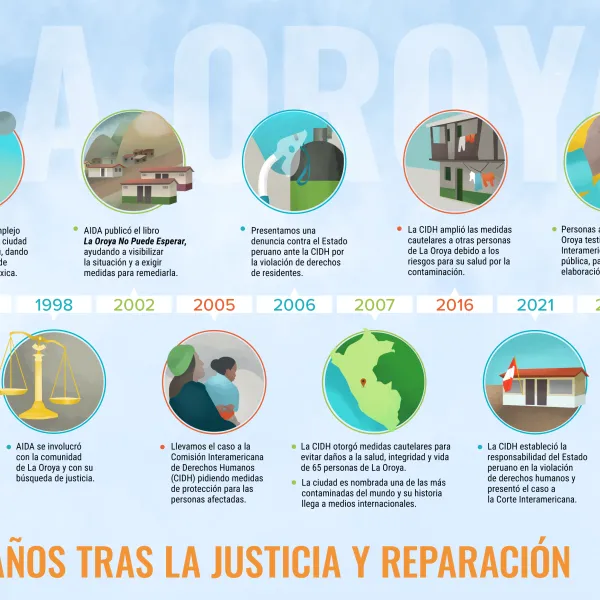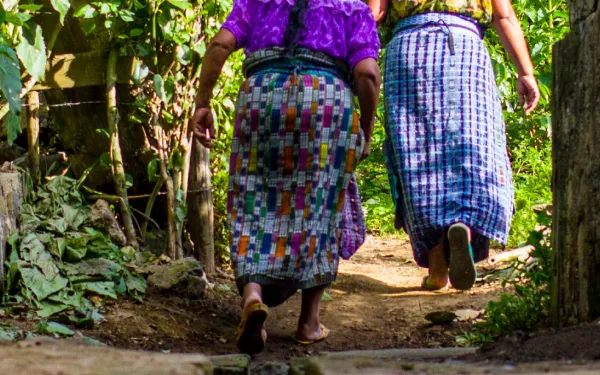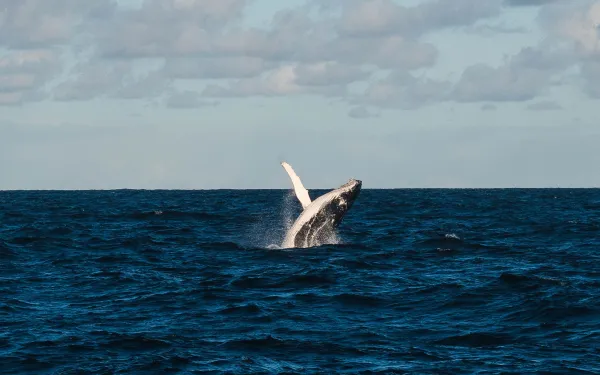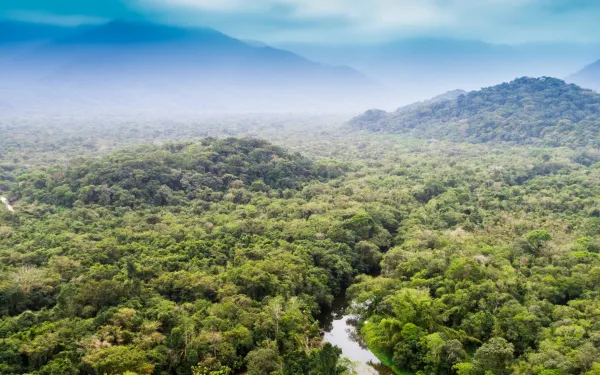
Project
Protecting the health of La Oroya's residents from toxic pollution
For more than 20 years, residents of La Oroya have been seeking justice and reparations after a metallurgical complex caused heavy metal pollution in their community—in violation of their fundamental rights—and the government failed to take adequate measures to protect them.
On March 22, 2024, the Inter-American Court of Human Rights issued its judgment in the case. It found Peru responsible and ordered it to adopt comprehensive reparation measures. This decision is a historic opportunity to restore the rights of the victims, as well as an important precedent for the protection of the right to a healthy environment in Latin America and for adequate state oversight of corporate activities.
Background
La Oroya is a small city in Peru’s central mountain range, in the department of Junín, about 176 km from Lima. It has a population of around 30,000 inhabitants.
There, in 1922, the U.S. company Cerro de Pasco Cooper Corporation installed the La Oroya Metallurgical Complex to process ore concentrates with high levels of lead, copper, zinc, silver and gold, as well as other contaminants such as sulfur, cadmium and arsenic.
The complex was nationalized in 1974 and operated by the State until 1997, when it was acquired by the US Doe Run Company through its subsidiary Doe Run Peru. In 2009, due to the company's financial crisis, the complex's operations were suspended.
Decades of damage to public health
The Peruvian State - due to the lack of adequate control systems, constant supervision, imposition of sanctions and adoption of immediate actions - has allowed the metallurgical complex to generate very high levels of contamination for decades that have seriously affected the health of residents of La Oroya for generations.
Those living in La Oroya have a higher risk or propensity to develop cancer due to historical exposure to heavy metals. While the health effects of toxic contamination are not immediately noticeable, they may be irreversible or become evident over the long term, affecting the population at various levels. Moreover, the impacts have been differentiated —and even more severe— among children, women and the elderly.
Most of the affected people presented lead levels higher than those recommended by the World Health Organization and, in some cases, higher levels of arsenic and cadmium; in addition to stress, anxiety, skin disorders, gastric problems, chronic headaches and respiratory or cardiac problems, among others.
The search for justice
Over time, several actions were brought at the national and international levels to obtain oversight of the metallurgical complex and its impacts, as well as to obtain redress for the violation of the rights of affected people.
AIDA became involved with La Oroya in 1997 and, since then, we’ve employed various strategies to protect public health, the environment and the rights of its inhabitants.
In 2002, our publication La Oroya Cannot Wait helped to make La Oroya's situation visible internationally and demand remedial measures.
That same year, a group of residents of La Oroya filed an enforcement action against the Ministry of Health and the General Directorate of Environmental Health to protect their rights and those of the rest of the population.
In 2006, they obtained a partially favorable decision from the Constitutional Court that ordered protective measures. However, after more than 14 years, no measures were taken to implement the ruling and the highest court did not take action to enforce it.
Given the lack of effective responses at the national level, AIDA —together with an international coalition of organizations— took the case to the Inter-American Commission on Human Rights (IACHR) and in November 2005 requested measures to protect the right to life, personal integrity and health of the people affected. In 2006, we filed a complaint with the IACHR against the Peruvian State for the violation of the human rights of La Oroya residents.
In 2007, in response to the petition, the IACHR granted protection measures to 65 people from La Oroya and in 2016 extended them to another 15.
Current Situation
To date, the protection measures granted by the IACHR are still in effect. Although the State has issued some decisions to somewhat control the company and the levels of contamination in the area, these have not been effective in protecting the rights of the population or in urgently implementing the necessary actions in La Oroya.
Although the levels of lead and other heavy metals in the blood have decreased since the suspension of operations at the complex, this does not imply that the effects of the contamination have disappeared because the metals remain in other parts of the body and their impacts can appear over the years. The State has not carried out a comprehensive diagnosis and follow-up of the people who were highly exposed to heavy metals at La Oroya. There is also a lack of an epidemiological and blood study on children to show the current state of contamination of the population and its comparison with the studies carried out between 1999 and 2005.
The case before the Inter-American Court
As for the international complaint, in October 2021 —15 years after the process began— the IACHR adopted a decision on the merits of the case and submitted it to the Inter-American Court of Human Rights, after establishing the international responsibility of the Peruvian State in the violation of human rights of residents of La Oroya.
The Court heard the case at a public hearing in October 2022. More than a year later, on March 22, 2024, the international court issued its judgment. In its ruling, the first of its kind, it held Peru responsible for violating the rights of the residents of La Oroya and ordered the government to adopt comprehensive reparation measures, including environmental remediation, reduction and mitigation of polluting emissions, air quality monitoring, free and specialized medical care, compensation, and a resettlement plan for the affected people.
Partners:

Related projects

Open Letter from Civil Society Organizations to the President of the Inter-American Development Bank
The undersigned group of civil society organizations greet you as you begin your term as President of the Inter-American Development Bank. We extend to you our best wishes as you assume this task of great responsibility for the people of Latin America and the Caribbean.We take this opportunity to introduce ourselves and express our willingness to continue contributing to the Bank's actions pursuing the region's development. Since 2017, our organizations have been monitoring and making recommendations on the IDB policies and projects, in partnership with local communities and populations. In particular, we promote the Bank’s establishment of better social and environmental policies and practices, as well as adequate and transparent spaces for participation that allow improving the IDB's link and interaction with civil society. To mention just a few examples, we highlight our contributions to the Environmental and Social Policy Framework (ESPF), to the updates of the MICI policy and in the accompaniment of specific cases, and in the revision process of the Access to Information Policy and in the dialogues on the IDB-Amazon Initiative.In conjunction, we are permanently monitoring the Bank's policies and investments throughout the region, including in projects involved in the response to and recovery from the Covid pandemic and many others.We consider it essential that the Bank strengthen its practices and operations, facilitating the promotion and respect for human rights, with special attention paid to the needs of communities and indigenous peoples who are at the forefront in the defense of nature, as well as the protection of key ecosystems in the fight against climate change.Given the relevance of public participation in promoting full development, we reiterate our request to the Bank to generate constructive and lasting participation mechanisms. In particular, we request that the space for dialogue with civil society be reopened in the framework of the next IDB Annual Meetings. This space was a traditional practice that was interrupted in 2014 and has not been resumed to date.We understand that a space for IDB articulation with civil society (social organizations and movements, Indigenous groups, and others who are affected) is not only a good practice that other multilateral agencies are already implementing, but would also contribute to advance the objectives of your administration. As stated in your inaugural speech last January, you stressed your desire to "seize all opportunities for dialogue" and collaborate with different actors to address the most pressing problems of our region.Thus, your administration has an historic opportunity to generate greater openness towards civil society organizations and communities potentially affected by Bank-financed operations. We believe that this demand can no longer be postponed, and that this long-standing claim must be addressed in order to strengthen the work together with the peoples of the region.We remain at your disposal to discuss the points raised in this letter and other matters of common interest at your convenience. Kind regards, Accountability CounselAMATE El SalvadorArticulación Salvadoreña de Sociedad Salvadoreña de Sociedad Civil para la Incidencia en las Instituciones Financieras Internacionales (ASIFI)Asociación Ambiente y Sociedad (Environment and Society Association)Interamerican Association for the Defense of the Environment (AIDA)International Accountability ProjectBank Information CenterCenter for International Environmental Law (CIEL)Coalition for Human Rights In DevelopmentCohesión Comunitaria e Innovación Social A.C. (Mexico)Conectas Direitos HumanosDerecho, Ambiente y Recursos Naturales (DAR, Perú)Ecoa - Ecology and ActionFoundation for the Development of Sustainable Policies (Fundeps)CAUCE Foundation: Environmental Culture - Causa Ecologista (Argentina)Gender ActionInternational RiversMesa de Discapacidad y Derechos (Perú)International Platform against ImpunityProtection International MesoamericaSociedad y Discapacidad - SODIS (Perú)Sustentarse (Chile)Wetlands International / Fundacion Humedales (Argentina) Read and download the letter
Read more
Decision time for world’s governments on new global treaty for the ocean
New York: Today governments resume negotiations at the United Nations in New York to finalize a new High Seas Treaty to ensure the conservation and sustainable use of marine biodiversity of areas beyond national jurisdiction. The two-week Intergovernmental conference is taking place from 20 February to 3 March 2023 and is a resumption of negotiations from August 2022, when governments ran out of time. Covering half of the planet, the High Seas support vibrant marine ecosystems, life that is vital to the global food supply, and the planet’s climate system. However, it has been plagued by poor or patchy governance, and with only 1.2% protected, vast High Seas areas are open to unsustainable exploitation. This new treaty aims to address these shortcomings and offers a historic opportunity to put in place game-changing new measures for the ocean, including establishing highly and fully protected areas and strengthening assessment and management of human activities. The recent global commitment to protect at least 30% of the ocean by 2030 (the “30x30” goal) offers an ambitious backdrop for ensuring this new treaty provides the legal tools to turn the target into a reality. The pressure is now on governments to ensure the treaty that is finally agreed upon will be ambitious enough to result in a healthy ocean rather than a degraded one. Key issues that still need to be addressed at the meeting include: measures to ensure that the new treaty can deliver effective new marine protected areas rather than “paper parks”; safeguards to avoid harm arising from human activities affecting the high seas and the deep seabed; a strong institutional framework to ensure effective implementation and compliance; decision-making rules to avoid enabling one or two countries to block progress; and critical finance and equity issues related to capacity building and the sharing of benefits from marine genetic resources. "We came frustratingly close to getting this treaty over the line in August at what was supposed to be the final round of negotiations. With the accelerating climate and biodiversity crises, time is not a luxury we have to put ocean health back on track," said Sarah Bevis from the High Seas Alliance. "This time round we need to seize the moment and get an ambitious treaty over the finish line, so we can roll up our sleeves and work on the crucial tasks of getting the treaty ratified and implemented." Additional Quotes from High Seas Alliance member organizations: Dr Laura Meller, Oceans Campaigner and Polar Advisor, Greenpeace Nordic said: "The oceans support all life on Earth. Their fate will be decided at these negotiations. The science is clear. Protecting 30% of the oceans by 2030 is the absolute minimum necessary to avert catastrophe. It was encouraging to see all governments adopt the 30x30 target last year, but lofty targets mean nothing without action." "This special session taking place so soon after the last round of negotiations collapsed gives us hope. If a strong Treaty is agreed on the 3rd of March, it keeps 30x30 alive. Governments must return to negotiations ready to find compromises and deliver an effective Treaty. We’re already in extra time. These talks are one final chance to deliver. Governments must not fail." Trevor Jones, Campaign Manager, Only One said: "Without protections for the high seas, we cannot hope to have a healthy ocean, and without a healthy ocean we put marine life, coastal livelihoods, and global food stability at grave risk. Millions of people from around the world have spoken out: They want a strong High Seas Treaty, and they’re counting on their leaders to finally get the job done." Liz Karan, Director of Pew’s Ocean Governance Project said: "The high seas support diverse marine life and unique ecosystems critical to the health of our ocean and planet. Countries must seize this opportunity to finalize a robust high seas treaty to establish highly protected, cross sectoral high seas MPAs for the benefit of current and future generations." Jennifer Morris, CEO of The Nature Conservancy said: "Ensuring legal protection for the vast areas of open ocean beyond national jurisdiction, and actively acknowledging the importance of addressing this situation, is a pivotal step in moving toward our ambitious ‘30x30’ target in the new UN Global Biodiversity Framework. Ensuring a successful outcome from the New York negotiations, in the form of a formally agreed and legally binding High Seas Treaty, is imperative to meet the collective commitment to conserve 30% of the Earth’s ocean this side of 2030." Gladys Martínez, Executive Director of the Interamerican Association for Environmental Defense (AIDA) said: "The high seas urgently needs a governance framework. We look forward to states concluding a strong and ambitious treaty during these two weeks." Fabienne McLellan, Managing Director OceanCare said: "We have high hopes that governments will find a way to finalize the High Seas Treaty during the resumed session of IGC 5. Countries must understand that it would be grossly negligent to once again fail to conclude an agreement to conserve marine diversity in areas beyond national jurisdiction. The climate and biodiversity crises are in full swing, and the ocean is our ally, not an infinite resource to be exploited. It is not only important that the Agreement is finalized, but what is agreed needs to make a tangible difference in protecting biodiversity. Against this backdrop, it is difficult to imagine that no agreement will be reached - the agreement is vital for marine biodiversity, a healthy ocean and thus also for us humans". PRESS CONTACTS Patricia Roy, + 34 696 905 907 - CET Mirella von Lindenfels, +44 7717 844 352 - EST
Read more
Actions and reasons to preserve the Amazon
Shared by eight countries and home to 10 percent of the planet's known biodiversity, the Amazon is the largest tropical forest in the world. It’s also a global climate stabilizer, storing between 90 and 140 billion metric tons of carbon dioxide (CO2)—one of the most harmful greenhouse gases that, when released, accelerates the climate crisis. For more than 470 communities of indigenous and traditional peoples, the Amazon is an ancestral place of life, from which they have developed their ways of being in the world. However, the rainforest is facing various threats—including colonization, deforestation and extractive activities—that increase its vulnerability and affect the human rights of those who inhabit and protect it. These pressures have caused some areas of the Amazon to emit more carbon dioxide than they absorb. This situation poses the challenge of implementing strategies for the legal protection of Amazonian territories that articulate with the struggles of affected peoples. At AIDA, we have strengthened these strategies and have supported community processes aimed at combating the damage caused by mining and oil exploitation in Amazonian territories in three countries. With hopes currently pinned on the incoming government of Lula da Silva in Brazil—who announced his goal of reducing deforestation in the Amazon to zero by 2030—the preservation of this ecosystem requires political will and strong coordinated and cross-border actions. In this regard, Colombia proposed a common front to defend the Amazon rainforest. Strengthening legal defense AIDA's work strengthened the capacities of national organizations in Brazil, Ecuador and Peru for legal defense of the Amazon. Brazil: By highlighting the shortcomings of its environmental impact study, we helped ensure that the communities affected by the Volta Grande mining project of the Canadian company Belo Sun are included in the environmental authorization process and that the state is obligated to consult with them to obtain their consent. We also prepared a report for UN agencies in which we identified measures to guarantee the safety of environmental defenders in the Amazon region. Ecuador: We strengthened litigation strategies to halt the implementation of a decree by which the government seeks to expand mining exploitation in the country, with serious impacts for the Amazon region. We also generated greater understanding of the tools needed to develop strategic litigation and improve the communication skills of indigenous peoples. Perú: We supported the acceleration of litigation aimed at ensuring the repair and maintenance of the Norperuano oil pipeline, whose operation has generated serious environmental impacts and human rights violations for indigenous peoples affected by oil spills. In all three countries, we were able to advance towards a more precise understanding of the legal protection needs of the Amazon and the contexts in which such strategies should be developed. This was made possible by working in partnership with national and local organizations and indigenous peoples. Arguments to protect the ecosystem There are many reasons to preserve the Amazon, whose importance is regional and global. In order to strengthen communication efforts linked to the legal protection of the ecosystem, AIDA has developed two infographics that present in a schematic and didactic way the arguments for defending the Amazon territories, as well as their inhabitants, in court. The focus of one of the infographics is the vast biodiversity contained in the Amazon. Some figures show its high levels of richness: 40,000 species of plants; 16,000 of trees; 3,000 of fish; 1,300 of birds; more than 430 of mammals; more than 1,000 of amphibians; and more than 400 species of reptiles; therefore, any intervention in the Amazon rainforest must start from the knowledge of it as a highly diverse, complex and interconnected territory. The richness of the Amazon is also cultural, represented in the indigenous and traditional peoples that have inhabited the ecosystem since ancestral times, whose diversity is present in 86 languages and 650 dialects. The Amazon: A megadiverse region (in Spanish) The other infographic illustrates the capacity of the Amazon to regulate the humidity and climate of the continent. In addition to storing large amounts of carbon dioxide, the ecosystem absorbs half of the solar energy it receives through the evaporation of water from its foliage. Most of the trapped energy is released when the vapor condenses to form clouds and rain. Among other things, the Amazon recycles between 50% and 70% of annual precipitation, pumping some seven billion tons of water a year into the atmosphere through evapotranspiration. The Amazon: A global climate regulator (in Spanish) The Amazon and its care are emblematic of the intrinsic relationship and balance that must exist between a healthy environment and human existence. "The spirits that give us life exist in the forest, the water and the air. We all have a correlation," said Humberto, a member of a community in the Ecuadorian Amazon. "That existence is what we call life—our own home, the pharmacy, nature or what we can call, in general, the existence of man and nature."
Read more